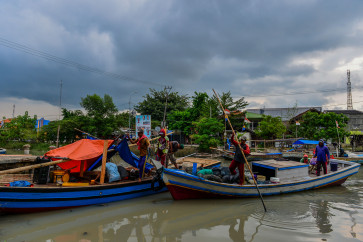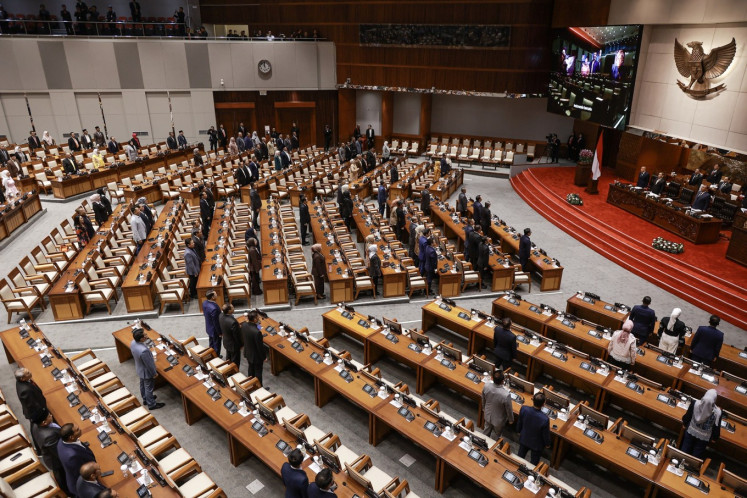Popular Reads
Top Results
Can't find what you're looking for?
View all search resultsPopular Reads
Top Results
Can't find what you're looking for?
View all search resultsWinners and losers of Indonesia's new negative list
The expected removal of 35 business lines from the negative investment list is anticipated to lure inbound investment to rejuvenate the national economy after a bruising year of sluggish growth and entrenchments
Change text size
Gift Premium Articles
to Anyone
T
he expected removal of 35 business lines from the negative investment list is anticipated to lure inbound investment to rejuvenate the national economy after a bruising year of sluggish growth and entrenchments.
Business lines that are potentially open for 100 percent foreign investment will see the most benefit. Offshore investors may want to consider taking advantage of the new negative list quickly to gain a foothold. E-commerce, technology and infrastructure sectors will be ripe for foreign investment and development.
The principles that will be adopted in the new negative list, as outlined in the government's 10th economic policy package, seem to focus on rolling out the welcome mat to foreign investors, while at the same time giving proportional protections for Small Medium Enterprise (SMEs) in various sectors.
The removal of 35 business lines from the negative list is anticipated to lure inbound investment to rejuvenate the national economy after a bruising year of sluggish growth and retrenchments. These business lines include toll roads, e-commerce (with investment of more than Rp 100 billion or US$7.3 million), film industry, cold storage, telecommunication device testing and restaurants, among others.
As reported in the media, the lifting of the foreign investment restriction/prohibition outlined in the economic package was immediately hit by criticisms and protests by local players who engage in those 35 business lines.
They accused President Joko 'Jokowi' Widodo's administration of making irrelevant policies, misunderstanding the economy, neglecting the fate of local businesses and selling out the country to foreigners. The last one being the common theme of various accusations towards the President. However, the fact that protections are concurrently being put in place for local SMEs may help to somewhat dampen the critics' position on this issue.
Business lines that are potentially open for 100 percent foreign investment will see the most benefit from the new negative list. These include the film and cinema industry, toll roads, e-commerce (for stakes of more than Rp 100 billion) and cold storage.
The opening of these business lines is expected to give more value to the customers. Take the film and cinema industry, for example. As briefly indicated above, currently, there are only three major players operating cinemas throughout Indonesia.
As each player already enjoys a sizeable income, they are less incentivized to innovate and expand into more cities. As a result, 87 percent of all cinema screens are in Java and an astonishing 35 percent are within Jakarta alone.
With more competitors, existing companies will be forced to open up branches in more cities to maintain their profit, hence more people will be able to enjoy the cinema experience. More foreign investors will trigger a more competitive labor market as well. At the end of the day, consumers will reap the benefits.
Another useful example is the e-commerce business. Since the beginning of his administration, the President has seen the technology industry as one of the nation's potential economic drivers in years to come, claiming that Indonesia can become Southeast Asia's largest digital economy by 2020.
The President's recent remarks (e.g that he is looking to produce 1,000 technology entrepreneurs by 2020) and his visit to Silicon Valley last month underlined his ambition in pursuing the technology dream. Although there is still a lot of homework to be done, the lifting of foreign ownership restrictions in this sector has been praised by those in the market who believe that e-commerce should always have been exempt from investment controls to boost the injection of 'smart money' from people with experience of the more developed e-commerce landscape overseas.
Some lines of business will be subject to more protection for the benefit of locally owned micro, small, medium and cooperative businesses. 19 lines of business related to construction services utilizing low/medium technology with a certain maximum project value are to be reserved for local SMEs.
Also, certain project value thresholds in 39 lines of business in the construction sector that are reserved for local SMEs will, under the new laws, be increased significantly, i.e. from Rp 1 billion to Rp 50 billion. This means that foreign construction services companies can only qualify for construction projects with a value of more than Rp 50 billion.
The requirement to have a partnership with a local SME are to be imposed on three new lines of business, i.e plantation seeding (for an area of more than 25 hectares), sugar industry and retail trading through mail order or the internet.
As Indonesia develops, toll road infrastructure is increasingly required to increase the productivity of the economy, especially in the underdeveloped areas outside of the main islands of the archipelago.
Accordingly, the government plans to launch the construction of 1,000 km of toll roads over the next five years, with an average construction rate of 200 km of roads per year from 2015 until 2019. The National Development Planning Board (Bappenas) estimates that the construction of these new roads will require an investment of Rp 128.7 trillion.
When one compares the 17 percent annual growth rate in the number of vehicles with the growth of road length of one percent per year, there is little doubt that the opening of the toll road business is seen by some as an attractive feature of the new negative list.
Offshore investors may want to consider taking advantage of the new negative list quickly in order to gain a foothold in industries that are not yet heavily regulated. Take the e-commerce sector for example, which has long been a question mark for foreign investors.
Early birds had previously managed to obtain approval from the Investment Coordinating Board to invest in this business line, but more recently, that privilege has been squeezed, with the Investment Board taking a view that e-commence space is closed for foreign investment.
Rumor has it that the opening of e-commerce (with investment of more than Rp 100 billion) under the new negative list will be followed with the launch of an e-commerce industry roadmap by the government. Pending the launch of the roadmap, investors who arrive at the party early could benefit from entry into the industry before more detailed regulation is enforced.
Another example is the film/cinema industry. Indonesian cinema business is dominated by two or three key players. Clearly, the government has signaled its intention to stimulate more investment in this sector by allowing foreign investors to invest in developing alternative cinemas that can cater for a wider audience. As a result, the government will put in place regulations relating to this business (e.g. to regulate the distance between a foreign-owned cinema to a local one) in a bid to protect local investors.
Hence, timing is key when entering the market, particularly if local players are lobbying the government to develop and enforce protective regulations.
_______________________________
The writer is a partner of Ginting & Reksodiputro, in association with Allen & Overy. He mainly practices in the areas of corporate and commercial laws, including public and private M&A, joint ventures.










